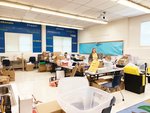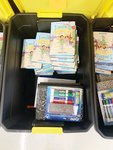


Nearly 2,000 K-12 students are signed up for this year’s Chatham County Schools summer programming, a staggering increase from the typical years’ registration of about 300 K-3 students, according to the district’s estimates.
While the district previously offered high school recovery programs, its past summer curriculum focused primarily on K-3 students. This year, most summer classes began this week and include 10 programs for students across all grade levels — another significant increase, and the result of increased federal and state funding to help schools address potential COVID-19 learning loss.
Throughout the pandemic, CCS received a total allotment of about $18.8 million as part of North Carolina’s Elementary & Secondary School Emergency Relief (ESSER) funds, to be spent over the next few years. About $17.4 million of that money, allocated through December’s federal relief act and the American Rescue Plan Act, will be spent on technology and connectivity devices, at least 68 school and district staff positions and more — including summer programming over the next three years.
The CCS Board of Education approved the district’s summer learning plan in April. The plan includes elements mandated by House Bill 82, which state legislators unanimously approved on April 1 to combat COVID-19 learning challenges.
“We bring a similar plan to you every summer of this nature,” Amanda Hartness, CCS assistant superintendent of Academic Services & Instructional Support, told the board at its April meeting. “We’ve always had a tradition of offering summer opportunities for our students, but this year, it comes with many more layers of complexity and requirements.”
HB82 requires school districts to offer students at least 150 hours or 30 days of in-person summer instruction, along with a minimum of one enrichment activity during each instructional day. While the program is geared toward at-risk students, any student may attend, provided there’s space for them.
Chatham County Schools invited more than 3,000 students to take part, and to date nearly 1,200 have enrolled in K-8 and about 425 in high school programming, with the potential for up to another 300 high schoolers who will participate in online course credits through N.C. Virtual School or Central Carolina Community College.
The opportunities are open to all students, and participation is voluntary.
“What’s different in our district,” Hartness told the News + Record, “(is that) in addition to the required pieces for the academic components, we’re also offering these other free opportunities to any student in the district, regardless of who is on grade-level or not.
An overview of the programming, “Ignite Chatham: Empowering Learners,” includes the dates, times and contact information for the district’s 10 different summer programs, which you can view in the information box adjacent to this story.
After a year of remote and hybrid learning — including a virtual summer program last summer — this year, all instruction will be in-person. As mandated by the state, these programs include meal services and physical activity for each instructional day, small group instruction, social emotional support and transportation. It also includes instruction for End of Course subjects and credit recovery opportunities at the high school level. K-8 students can also receive reading, math and science instruction, with science required for grades 3-8.
The district previously estimated the six-week program would cost $1.5 million, to be fully funded by various federal and state funds. The summer program’s approximately 100 staffers will be paid their daily rates of pay, plus a $1,200 bonus — dictated by the state for certain teachers but expanded by CCS to all certified summer staff.
“That’s something that we’ve chosen to do to entice our staff to want to work,” Hartness said.
She said the district originally “fell short” in having enough exceptional children teachers signed up for the summer, as those classes require one teacher for every student. EC (exceptional child) teachers will get a $2,000 bonus instead.
“We needed more staff to support EC, and that’s our most vulnerable group of students,” Hartness said. “It was really important that we were able to serve those students and that we were able to have appropriate staff to keep them safe.”
In addition, 3rd-grade teachers can earn $50 for each student who passes the reading end-of-grade assessment by the program’s end.
CCS teachers will also get tubs filled with classroom supplies and materials, along with lesson plans with digital links to resources. In some other districts, summer teachers come up with their own lesson plans and get little to no supplies.
“That’s one thing I’m really proud of,” Hartness said of the supplies, “And we’ve had programs like this for years, as far as the way we do our summer camps.”
The district is also paying classified staff — such as custodians, bus drivers and instructional assistants — time and a half and a $500 bonus. Bonuses for classified staff were not required by the state.
Also not required by the state, the district partnered with dozens of community organizations to provide summer enrichment opportunities for students beyond its 10 programs — camps for dual language, theater, dance, recycling and more. (You can view the full list of offerings here.)
CCS students can attend such opportunities for free; the district is paying for any student enrolled at CCS to attend.
“We have thousands of our students who are going to leadership camps and poetry camps and YMCA camps, parks and rec camps, dance, theater, camps, all kinds of things. Any student in Chatham County Schools that desires to have some type of summer opportunity could access it if they so desire,” Hartness said, adding that it’s a “win-win” for all groups involved.
This is what Chatham County, and this type of small community, is all about, she said.
“Everybody lost something during COVID,” she said, “whether it be business, whether it be academics, whether it be socialization, time or loss of income. To me, this summer program is just that perfect partnership of kind of filling the gaps that COVID left for all of those different groups.”
Reporter Hannah McClellan can be reached at hannah@chathamnr.com or on Twitter at @HannerMcClellan.